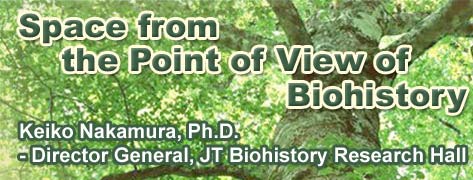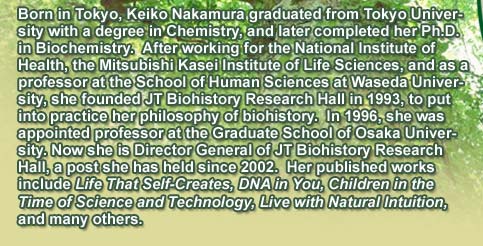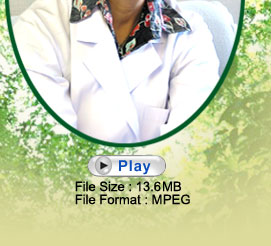 Q. Could you tell us what biohistory is? Q. Could you tell us what biohistory is?
Biohistory is reading and learning about the history of life. The original meaning of "history" in Greek is first to search, and then to record. The recording becomes history. I believe that life can be grasped that way as well.
I had two reasons for wanting to build the Biohistory Research Hall.
The life sciences, which I have been involved in for a long time, look at whole organisms based on DNA. It is fascinating to discover the common elements among all living things on Earth. We see a wide diversity of life every day, so it is very interesting to find commonalities between very different creatures. But after discovering that ants and humans are basically the same, this question comes up: why are ants ants, and what makes us human? Universality and diversity are basic topics in biology. As I was thinking about the question, I came to realize that diversity and universality can be studied at the same time using genomes (DNA). One motivation for founding this hall was to look for an answer to that basic question.
Secondly, modern science is basically like mechanical theory, looking at creatures as if they were machines. There is a belief that it is possible to understand living things by reducing them down to their elements and analyzing their structures and functions. I disagree with that. Creatures are historical beings. We must learn the process of how humans became humans, and how ants became ants. It used to be that the only things we could learn from were fossils, and there wasn't much other information available. But now we have genomes, through which can see the history of life. The history of each creature is carved on its genome. For example, my genes were passed on from my parents, and theirs came from their parents, etc. Thus, it is possible to track very far back. Genes in a living thing are history in themselves, going all the way back to the beginning of life some four billion years ago.
We can study the history of life, but the fact is, the act of living itself reflects this history. By paying close attention to living creatures, we can read their stories.
 Q. What is the significance of space to biohistory? Q. What is the significance of space to biohistory?
 When you think about life not in terms of structures and functions but why today's creatures are what they are now, you have to go back about four billion years, when life was formed on Earth. We believe that the common ancestors of all of today's creatures were born in the sea. Naturally, the next question is how a planet with such oceans was formed. When you wonder about Earth, the next thing you think about is space. When you think about life not in terms of structures and functions but why today's creatures are what they are now, you have to go back about four billion years, when life was formed on Earth. We believe that the common ancestors of all of today's creatures were born in the sea. Naturally, the next question is how a planet with such oceans was formed. When you wonder about Earth, the next thing you think about is space.
First was the beginning of space, and later Earth was formed. Then creatures were born on the planet, and I exist here today. Life is connected to space in just such a time flow. This is a characteristic of biohistory.
What is space? How did it begin? How was Earth formed and life created? I have a lot of hope that space development and exploration will allow us to learn the answers. I am very curious about space.
|







